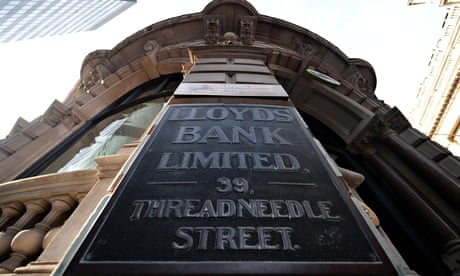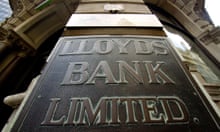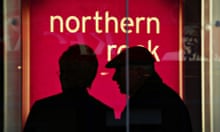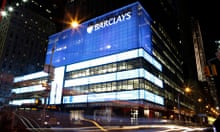Profits at Lloyds Banking Group more than halved in the first six months of the year as its bill for the payment protection insurance (PPI) scandal increased by £600m and it paid out penalties for rigging interest rates.
The unexpectedly large new provision for PPI took the amount set aside by the 24% taxpayer-owned bank to £10.4bn and pushed the industry's tally for the biggest mis-selling scandal in history to more than £23bn.
António Horta-Osório, Lloyds' boss, apologised for the interest rate manipulation, which saw the bank hit with a bill of £226m on Monday. He warned that further "legacy" issues meant it had to make further provisions, which in total reached £1.1bn in its first-half results.
The bank, which has the biggest PPI bill of any lender and owns Bank of Scotland and Halifax, admitted the cost of the PPI mis-selling - it has received claims for 40% of the policies sold since 2000 - could escalate.
Horta-Osório is preparing to present a new three-year plan to the bank's board that is likely to spark fears of bank closures and another swathe of job cuts on top of 15,000 earmarked for his first three years. At the helm since March 2011, when he broke ranks with the industry to begin paying out PPI claims, he committed to stay to "at least" 2017 to see through his new strategy, which will be unveiled in the autumn.
The pre-tax profits of £863m – down by £1.3bn from a year ago – were overshadowed by the £226m in fines imposed this week, including compensation to the Bank of England, which showed traders had been manipulating interest rates to cut fees for its emergency lifeline in the financial crisis. It was "as shocking to us as it was to you", he said. "I would like to say again we feel the actions of those individuals was totally unacceptable and we condemn them without any reservation ... I am sorry for the impact the actions of these individuals have had on our customers, our colleagues and our shareholders."
The bank's remuneration committee will be looking at the implications for bonuses for 22 individuals highlighted by regulators as well as others who may have to be penalised for the manipulation, which took place between 2006 and 2009.
No commitment was made about publicising the outcome of the disciplinary proceedings, but chairman Lord Blackwell, who had to write to the Bank of England governor Mark Carney to apologise for the rate manipulation, said: "We will look at all the options (to claw back pay) but have to act within the current law."
The £1.1bn provision also included £225m to cover ongoing regulatory issues and £50m for interest-rate swaps mis-selling, where it has now provided £580m in compensation.
Horta-Osório said these issues should not have an impact on the underlying performance, by which measure profits rose 32% to £3.9bn. Bad debt provisions fell 58% to £758m.The bank is incurring £200m in costs a month for PPI and of the £10.4bn provision, some £2.1bn is to cover the cost of administrating claims.
The UK arm of Santander also took a new £65m provision for PPI after receiving claims from 300 claims management companies. The Spanish-owned bank said 45% of claims were from customers who did not have policies.
The City is waiting for the government to sell off the rest of its stake in Lloyds, which has fallen from 43% at the time of the bailout. Horta-Osório said the bank was "in better shape in terms of getting the taxpayers' money back".
Talks with the bank regulator the Prudential Regulation Authority about resuming dividends for the first time – after being blocked by the EU because of the bailout – will begin in the second half. Payouts from the bank, once one of the biggest dividend payers, will begin at a "modest" level but rise to at least 50% of earnings.
The shares fell 2.8% to 74.25p – just above the 73.6p at which the government breaks even on its stake.
The industry is facing an investigation by the Competition and Markets Authority, and Horta-Osório attempted to demonstrate competition in a market place in which Lloyds has market shares of over 18% in current accounts, mortgages and savings.
He signalled growth in the future in areas such as its Black Horse finance business, which is being helped by car sales, which it has been suggested have been fuelled by PPI claims. Asked about his new strategy, he refused to comment on job cuts or say branch closures were inevitable but talked about rapid growth of digital channels.
The bank also warned about impact of the Scottish vote on independence in September. "In the event of a yes[yes] vote, the scale of potential change is currently unclear, but we have been undertaking contingency planning," the bank said.








Comments (…)
Sign in or create your Guardian account to join the discussion